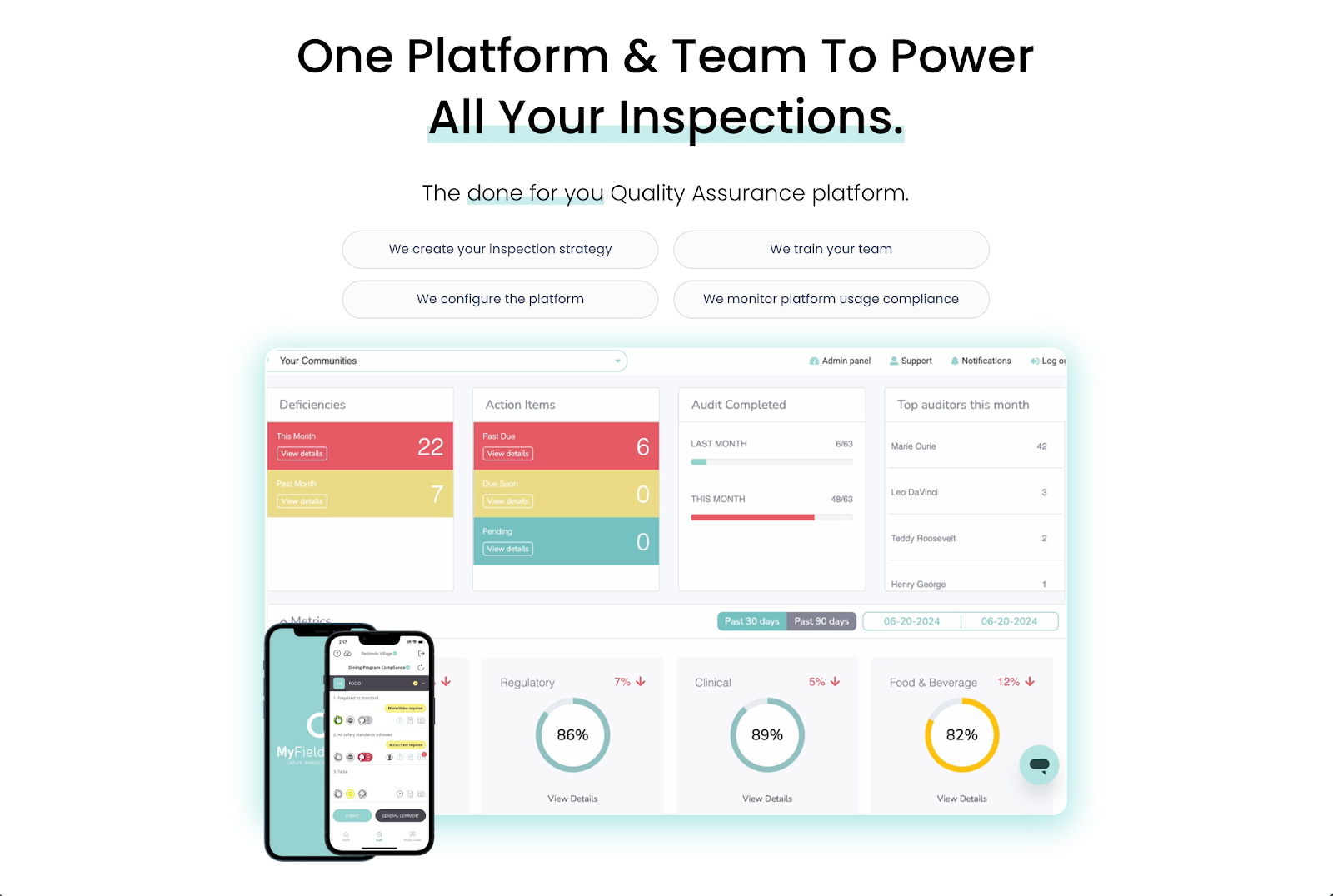.svg)
What Is a Food Safety Compliance System? Importance and More

Take Control of QA.
Make Inspections Effortless.

We’ll quickly uncover your needs and share how we can help—no pressure, no stress, just solutions. Grab your spot on our calendar today!
Be survey-ready every day with three simple dining audits

We’ll quickly uncover your needs and share how we can help—no pressure, no stress, just solutions. Grab your spot on our calendar today!
Food service management companies do more than prepare and serve meals. They should guarantee food safety to build customer trust and protect their business reputation.
Most operators use a food safety compliance system to pass legal standards, minimize risks, and avoid non-compliance penalties.
In this article, we'll explain what these systems are, why they matter, and how they can benefit your food business.
Understanding Food Safety Compliance System
A food safety compliance system offers a structured approach to maintaining food safety. It involves using tools and specific processes to comply with strict health and safety standards.
These regulations prevent food contamination, illness, and legal consequences. At the same time, they can protect consumers and employees.
Many organizations rely on a compliance system to track their adherence to different standards. This system helps operators monitor daily tasks, document practices, and prepare for food safety inspections, such as HACCP audits.
Different Food Safety Regulations to Follow
After learning the definition of a food safety compliance system, you might be curious to know the specific regulations companies must follow.
The truth is that these regulatory standards vary by state and region. However, they all aim to protect consumers and businesses.
Below, we'll take a closer look at the key state and federal regulations to follow to maintain food safety compliance.
FDA Guidelines
The U. S. Food and Drug Administration (FDA) plays an important role in regulating food safety. Its Food Code serves as the standard for safe food handling, storage, and preparation in retail settings.
It provides food producers and other food businesses with practical guidance on hygiene, cross-contamination prevention, and proper storage temperatures.
In addition to the Food Code, the FDA also enforces the Food Safety Modernization Act (FSMA). It requires food safety operations to follow strict preventive controls, which help avoid food contamination.
USDA Regulations
The U.S. Department of Agriculture requires any food business that handles meat, poultry, or egg products to follow several health and safety regulations.
The most popular ones include the Federal Meat Inspection Act and the Poultry Products Inspection Act.
These regulatory compliance requirements focus on production and food processing. They help maintain proper temperatures, track food origins, meet packaging standards, and avoid food fraud.
ISO 22000 Food Safety Management System Standards
ISO 22000 is an international standard that guarantees safety across the food supply chain. It applies to businesses working with global suppliers.
This framework integrates hazard analysis and monitoring systems. It can boost any company's credibility and show its commitment to food safety.
Good Manufacturing Practices
Good Manufacturing Practices (GMPs) help businesses maintain high safety standards throughout food production. They cover proper hygiene, equipment maintenance, staff training, and facility conditions.
By following GMPs, food companies ensure products are consistently safe and of high quality. They can prevent contamination and meet regulatory compliance across all stages of food production.
Local Health Department Regulations
Every state follows specific health department rules tailored to its population and climate. These standards cover everything from sanitation to food storage temperatures.
Food businesses should regularly review state regulations to stay compliant and build a good relationship with their local health inspector.
Why Is a Food Safety Compliance System Important?
Implementing a food safety compliance system is essential for several reasons:
Prevent Foodborne Illnesses
One of the primary reasons to use a compliance system is to prevent foodborne illnesses.
It helps you monitor key factors like food temperatures, hygiene practices, pest control management, and contamination risks. This makes it easier to spot and resolve hazards before they harm everyone who eats your food.
The compliance system can also standardize practices across the board. It requires employees to follow the same standards, such as wearing personal protective equipment (PPE) when handling food. This simple action can maintain cleanliness and reduce the chances of harmful bacteria or viruses causing illness.
Reduce Food Safety Issues
A compliance system lets you track and address potential risks early. For example, it can detect when food is stored at the wrong temperature and notify you immediately. This allows you to act quickly before the product becomes spoiled and potentially harms customers.
Additionally, a food safety compliance system makes sure employees follow proper storage, cooking, handling, and document management practices. This leads to fewer penalties, less waste, and more efficient food safety management.
Protect Business Reputation
Your company's reputation is one of your most valuable assets. However, a single food safety mistake can result in bad reviews, lost customers, or even legal issues.
Fortunately, a compliance system can protect your reputation in the food industry. It helps you maintain customer trust by consistently meeting safety standards, such as the Food Safety Modernization Act.
Plus, this system provides the necessary tools to document your compliance efforts. It can show customers and food safety inspectors that you prioritize safety and continuous improvement. This can lead to word-of-mouth recommendations and more clients.
Boost Operational Efficiency
Manually tracking food safety practices can be time-consuming and prone to errors.
A food safety compliance system can simplify this process by automating routine tasks. For example, it can create an audit checklist to help your restaurant or food business meet safety compliance.
The system can also digitally store compliance documents and generate comprehensive reports. It reduces the manual workload for your employees. This can increase operational efficiency and make your entire operation more effective.
Improve Employee Accountability
A food safety compliance system keeps your team on the same page. It assigns tasks, tracks completion, and holds everyone accountable for their responsibilities.
It can also show you who completed each task and when, which makes follow-ups easier.
Plus, the system can encourage employees to follow food safety protocols. That is because they have clear expectations and access to automated tools.
It promotes a culture of accountability and teamwork where food safety is everyone's priority.
Who Can Benefit From Food Safety Compliance Systems?
A food safety compliance system is valuable across various industries. Let’s discuss who benefits the most from using it below:
Food Service Companies
Contract food service businesses handle different events and locations. This makes it difficult to follow standard operating procedures and meet food safety standards.
A compliance system simplifies the entire process. It can track food temperatures, manage hygiene protocols, and document compliance efforts across the entire supply chain. This can prevent food safety hazards and build customer trust.
Restaurants
Restaurants deal with high customer turnover and busy kitchens.
Food safety management software helps them automate manual tasks like monitoring temperatures and tracking expiration dates.
It also guarantees employees follow safety protocols, reduce waste, and feel prepared for health inspections.
Senior Assisted Living Facilities
Food safety is also important in senior living facilities that serve food to their residents.
Older adults have weaker immune systems, which can make them more vulnerable to foodborne illnesses.
A food safety compliance system guarantees safe meal preparation and proper staff hygiene. It can protect residents’ health and give their families peace of mind. At the same time, it helps senior living facilities follow food safety laws and meet regulatory compliance.
Nursing Homes
Nursing homes face similar challenges to those of senior living facilities. These environments require strict food safety management processes tailored to the dietary needs of residents.
Luckily, a compliance system helps nursing homes safely prepare, store, and serve food. It can create checklists for survey preparation and generate reports to prove compliance.
Food Manufacturers and Processors
Food safety compliance systems are also important for manufacturers and processors. They help oversee food chain safety, monitor production processes, and document hazard control measures.
These systems guarantee that products meet safety standards before they reach consumers. They protect food businesses from recalls and liability issues.

Key Features of Food Safety Compliance System
After understanding who benefits from food safety compliance systems, it’s also important to know what these systems offer.
Below are the key components that make these systems valuable in the food industry:
Real-time Data Monitoring
This feature monitors important food safety factors like storage temperatures, humidity levels, and hygiene compliance.
It allows you to identify issues in real time, such as a freezer malfunction or a drop in cooking temperature. This can help maintain consistent safety standards and avoid costly mistakes.
Digital Forms
Food safety compliance systems eliminate the need for paper and manual record-keeping. Instead, they use digital forms for tasks like daily checklists, cleaning schedules, and temperature logs.
These forms are easy to fill out, store, and access during food safety inspections. They help save time and maintain accurate records, which can simplify audits.
Proactive Alerts
Compliance systems automatically notify you of potential issues before they become problems. For example, if a fridge’s temperature rises above a safe level, the system will send real-time alerts.
This feature can prevent contamination, reduce waste, and keep your business compliant with food safety regulations. It can also improve risk management, which helps maintain consumer confidence.
Extensive Reports and Analytics
Detailed reports help you track performance and identify trends during thorough inspections. These reports include valuable insights into temperature control, kitchen sanitation, and employee compliance.
Meanwhile, analytics tools can instantly spot recurring issues and areas for improvement. They help you make data-driven decisions for safer and more efficient operations.
Communication and Task Scheduling Tools
Compliance systems also have built-in communication and task-scheduling features. They can assign tasks, schedule reminders, implement corrective actions, and notify employees of updates.
These tools help in employee training. They can increase accountability and promote a strong food safety culture.
Mobile App
Mobile software makes your food safety compliance system accessible anywhere. It doesn't matter if you are in the kitchen, office, or off-site.
A mobile app allows you to monitor operations, check tasks, and review your food safety plan on your smartphone or tablet. This feature is a game-changer for businesses managing multiple locations.
How to Build an Effective Food Safety Compliance System
Understanding the key elements of a food safety compliance system is just the first step. You must build an effective one that works for your business. Here's how you can do it:
1. Establish Objectives
You should start by defining your food safety goals.
What are the key risks you need to address? For example, you might focus on preventing cross-contamination, ensuring proper storage, improving hygiene practices, or enhancing supplier management.
Clear objectives guide every decision you make about your compliance system. They also help you measure success and identify areas for improvement.
2. Learn the Applicable Regulations for Your Business
Next, you should understand the food safety regulations specific to your business. Not all standards apply to you, so you should carefully check local, state, and federal requirements.
You can also research industry standards like HACCP or ISO 22000.
Once you know the applicable laws for your food business, you can avoid fines, penalties, and other compliance issues during food safety inspections.
3. Develop a Food Hazard Control Plan
A hazard control plan identifies and mitigates risks in your food safety processes. This includes monitoring critical control points like cooking temperatures, storage, and cleaning procedures.
You should outline specific actions in your plan to address potential hazards and ensure compliance across the board.
4. Train Your Staff on Compliance Practices
Your system is only as effective as the people using it.
Train your employees on food safety protocols and how to use the system. You should provide hands-on training, regular refreshers, and easy resource access.
Once your staff understands their roles and responsibilities, meeting regulatory compliance becomes a team effort.
5. Maintain Accurate Documentation
Accurate records are important to prove food safety compliance during external and internal audits. These include HACCP plans, safety checks, temperature readings, and completed tasks, among other documents.
You should store them in a secure, preferably digital, location. Make sure they are up to date to avoid further questioning from auditors.
Digital records are easier to access anytime and anywhere. They can also eliminate the risk of paper forms getting lost or damaged.
6. Invest in Food Safety Software Solutions
If you want to enhance and automate all the steps above, use food safety compliance software.
This solution combines monitoring, reporting, and communication tools into one platform. It also includes customizable checklists that let you tailor processes to your needs.
However, make sure to choose software that suits your goals, company size, and budget. Consider built-in consulting services that can provide valuable insights into your food safety processes.
When you invest in the right solution, you can significantly save time, reduce errors, and maintain food safety consistently.
Achieve Food Safety Compliance With MyFieldAudits

Managing food safety compliance doesn’t have to be difficult. With MyFieldAudits, you get more than just a software solution. You also gain a dedicated partner committed to simplifying your on-site inspections and Quality Assurance programs.
MyFieldAudits handles the complexities of food safety, such as tracking compliance and training your employees. They allow you to focus on what matters most: running your business and providing excellent customer service.
Book a discovery call today, or watch this product overview video to learn more! You can also contact MyFieldAudits by dialing (844) 344-7265 for other inquiries.
FAQs About Food Safety Compliance System
What are the 7 rules of FSMA?
The seven rules of FSMA refer to the following: preventive controls, produce safety, sanitary transportation, foreign supplier verification program, voluntary qualified importer program, accredited third-party certification, and protection against intentional adulteration. These rules shift the approach to food safety from reactive to preventive, which can minimize food contamination risks.
What is the compliance of food safety?
Compliance with food safety means following laws that guarantee food is handled, prepared, and stored safely. These regulatory standards aim to prevent foodborne illness, minimize food waste, protect public health, and maintain consistent food quality.
What is the FSO system for food safety?
An FSO (Food Safety Objective) system sets measurable goals to reduce food safety risks. It helps you meet safety criteria before food products reach customers.
What is the difference between the FDA and the FSMA?
The FDA is the U.S. government agency that regulates food safety. FSMA, or the Food Safety Modernization Act, is a law enforced by the FDA. While the FDA is the regulator, FSMA refers to the rules under its authority that focus on preventing foodborne illness rather than reacting to outbreaks.
%201.svg)






%201%20(1).svg)